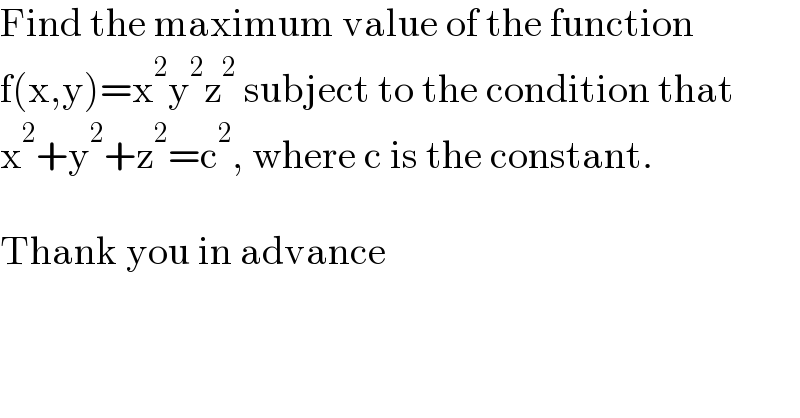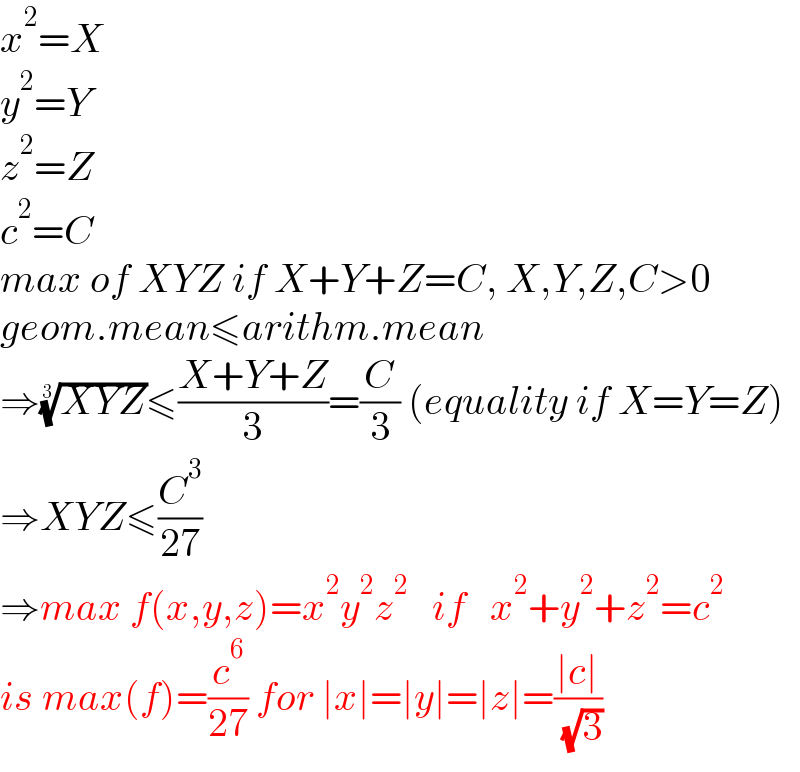
Question Number 203527 by Mastermind last updated on 21/Jan/24

$$\mathrm{Find}\:\mathrm{the}\:\mathrm{maximum}\:\mathrm{value}\:\mathrm{of}\:\mathrm{the}\:\mathrm{function} \\ $$$$\mathrm{f}\left(\mathrm{x},\mathrm{y}\right)=\mathrm{x}^{\mathrm{2}} \mathrm{y}^{\mathrm{2}} \mathrm{z}^{\mathrm{2}} \:\mathrm{subject}\:\mathrm{to}\:\mathrm{the}\:\mathrm{condition}\:\mathrm{that} \\ $$$$\mathrm{x}^{\mathrm{2}} +\mathrm{y}^{\mathrm{2}} +\mathrm{z}^{\mathrm{2}} =\mathrm{c}^{\mathrm{2}} ,\:\mathrm{where}\:\mathrm{c}\:\mathrm{is}\:\mathrm{the}\:\mathrm{constant}. \\ $$$$ \\ $$$$\mathrm{Thank}\:\mathrm{you}\:\mathrm{in}\:\mathrm{advance} \\ $$
Answered by aleks041103 last updated on 21/Jan/24

$${x}^{\mathrm{2}} ={X} \\ $$$${y}^{\mathrm{2}} ={Y} \\ $$$${z}^{\mathrm{2}} ={Z} \\ $$$${c}^{\mathrm{2}} ={C} \\ $$$${max}\:{of}\:{XYZ}\:{if}\:{X}+{Y}+{Z}={C},\:{X},{Y},{Z},{C}>\mathrm{0} \\ $$$${geom}.{mean}\leqslant{arithm}.{mean} \\ $$$$\Rightarrow\sqrt[{\mathrm{3}}]{{XYZ}}\leqslant\frac{{X}+{Y}+{Z}}{\mathrm{3}}=\frac{{C}}{\mathrm{3}}\:\left({equality}\:{if}\:{X}={Y}={Z}\right) \\ $$$$\Rightarrow{XYZ}\leqslant\frac{{C}^{\mathrm{3}} }{\mathrm{27}} \\ $$$$\Rightarrow{max}\:{f}\left({x},{y},{z}\right)={x}^{\mathrm{2}} {y}^{\mathrm{2}} {z}^{\mathrm{2}} \:\:\:{if}\:\:\:{x}^{\mathrm{2}} +{y}^{\mathrm{2}} +{z}^{\mathrm{2}} ={c}^{\mathrm{2}} \\ $$$${is}\:{max}\left({f}\right)=\frac{{c}^{\mathrm{6}} }{\mathrm{27}}\:{for}\:\mid{x}\mid=\mid{y}\mid=\mid{z}\mid=\frac{\mid{c}\mid}{\:\sqrt{\mathrm{3}}} \\ $$
Commented by Mastermind last updated on 21/Jan/24

$$\mathrm{Thank}\:\mathrm{you}\:\mathrm{so}\:\mathrm{much}\:\mathrm{but}\:\mathrm{could}\:\mathrm{you}\:\mathrm{please} \\ $$$$\mathrm{help}\:\mathrm{me}\:\mathrm{with}\:\mathrm{full}\:\mathrm{details} \\ $$$$ \\ $$$$\mathrm{Thank}\:\mathrm{you}\:\mathrm{once}\:\mathrm{again} \\ $$
Commented by aleks041103 last updated on 21/Jan/24

$${basically}\:{we}\:{use}\:{the}\:{inequality} \\ $$$${GM}\leqslant{AM} \\ $$$${where}\:{GM}\:{is}\:{the}\:{geometric}\:{mean} \\ $$$${and}\:{AM}\:{is}\:{the}\:{arithmetic}\:{mean} \\ $$
Answered by deleteduser1 last updated on 21/Jan/24

$${c}^{\mathrm{2}} ={x}^{\mathrm{2}} +{y}^{\mathrm{2}} +{z}^{\mathrm{2}} \geqslant\mathrm{3}\sqrt[{\mathrm{3}}]{{x}^{\mathrm{2}} {y}^{\mathrm{2}} {z}^{\mathrm{2}} }\Rightarrow{x}^{\mathrm{2}} {y}^{\mathrm{2}} {z}^{\mathrm{2}} \leqslant\frac{{c}^{\mathrm{6}} }{\mathrm{27}} \\ $$
